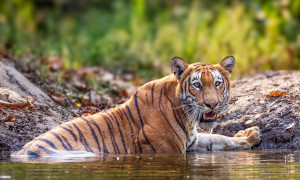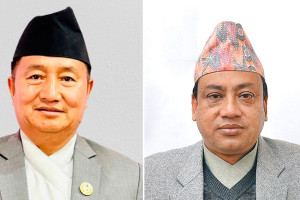Entertainment
In the vernacular
Kathmandu based Nhuja:–a band that creates and performs Newari songs–makes music with the intent of drawing younger audiences to listen to Newari songs so as to promote a language that is sl
Nhooja Tuladhar
About five years ago, Sumit Suwal, who was teaching music at the school got together with Pushpa Manandhar (a collegue), Nilaw Shakya, Sajiv Shrestha, Suman Shakya and Rahul Shakya (students at the school) to perform during the 20th anniversary of the school. During their first performance together, they felt a certain chemistry, and on the basis of that they decided to continue creating music together.
“We looked up to the Newa Beatles and wanted to do something similar when we started,” says Suwal, who was working as a commercial musician and an arranger prior to the formation of the band. “But eventually, we started making original music.”
“It’s a good thing that we started doing so,” adds Manandhar.
In 2009, Nhuja: self-produced their debut album, Lumanti. The album was largely pop rock with all-Newari lyrics. The six-track album was quite the hit in terms of record sales, as the band sold 1,200 copies out of the 1,500 they produced. “It’s during the Nhoo Daan [New Year] festivities that we manage to sell a lot of CDs,” says Shrestha. Tihar every year also brings with it the Nepali New year. “It’s great that the sales are good during that time, but it’s kind of sad that most people just buy CDs for the sake of supporting a Nepal bhasa band. Many don’t even go home and listen to what we’ve worked on,” says Suwal.
The lack of a proper fan following did not bother the band much, though. Two years after the first release, they came up with another album, titled Matina. The second record was more versatile in terms of the music styles. The album has 39 minutes of play-time and the genres switch between blues to rock to Newari folk. The album as a whole does not have an assertive sound. It’s almost like a radio playlist. “With the intention of gaining more listeners, we made our second album more assorted. We wanted to put it out there for the younger audiences who are into Hindi, English and Nepali pop,” says Suwal.
All the music that Nhuja: has created so far is self-produced. From the songwriting to recording to the sales, they do it themselves. The band says that it is cheaper for them to produce a record on their own. In a country where the music industry is not very huge, it is difficult for a band to create records and make good money out of it. In Nhuja:’s case, because they sing in a language that not everybody in the country understands, they are, in a way limiting their audience and this also impacts their record sales. So it would be too ambitious for such a band to get into a fully facilitated studio for sessions. “We have Sumit dai, who is capable of doing everything, so it isn’t that bad,” says Manandhar. “Because the band has the equipment and the skills to produce music on their own, it’s convenient and economic too. We just do it for the love of it and make no profit anyway,” adds Manandhar.
“Our main intention is to be able to promote Nepal bhasa through our music,” says Manandhar. The singer believes that lyrics, literature in its own right, is capable of saving a language and preserving it. The band’s lyrics are not formal Newari literature in anyway, though. They are based on the simple and locally spoken vocabulary. “We try not to use the language in a way that is too complicated for the listeners to understand,” adds Manandhar. Considering their intention is to contribute to the promotion and preservation of their language through their art, that’s a valid approach. For now, the band’s primary goal is to get their music out there. This Newari New Year, the group plans on coming out with a third album and the band plans on making the record as much commercially viable as possible. “Of course, we will not go to that extent where we have no fun making the music at all. But we plan on doing some experiments here and there. Maybe give it a more Newari folk feel, some reggae, some techno dhik-chuks and a whole lot of rock ‘n’ roll,” says Suwal.




 29.24°C Kathmandu
29.24°C Kathmandu












